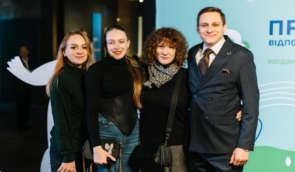Russia has killed two Ukrainian political prisoners and is endangering at least 21 others
The Soviet regime also denied Ukrainian political prisoners medical treatment and caused their deaths, but, according to one former Soviet political prisoner, the level of lawlessness was not as bad as now.
 Kostiantyn Shyrinh, Dzhemiil Gafarov, Servet Gaziev, Iryna Danylovych and Amet Suleimanov
Kostiantyn Shyrinh, Dzhemiil Gafarov, Servet Gaziev, Iryna Danylovych and Amet SuleimanovAt least 21 Crimean Tatar or other Ukrainian political prisoners are currently held in Russian captivity despite either having conditions which should preclude any detention, or urgently needing medical care. Russia is not only refusing to provide such healthcare, but also actively obstructs the political prisoners’ families from getting medication to them. Russia has already tortured one Crimean Tatar political prisoner to death although the country’s own legislation stated clearly that Dzhemil Gafarov should never have been held in custody. It bears direct responsibility also for the death in custody of 63-year-old Kostiantyn Shyrinh. The list of Russia’s political prisoners most urgently in need of medical care is appropriately named the Gafarov-Shyrinh List. The real number of men and women almost certainly in urgent, possibly life-saving, need of medical care is larger since Russia has been abducting and torturing civilian hostages since its full-scale invasion in February 2022. There are also a large number of civilian hostages and POWs held prisoner since before the full-scale invasion on territory occupied by Russia’s proxy ‘Donetsk and Luhansk people’s republics’.
At a press conference on 14 August, Ukrainian human rights groups presented their report, entitled “Gafarov-Shyrinh List’, on 21 (of well over 100) Ukrainian political prisoners in most urgent need of medical care. Viktoria Nesterenko from the ZMINA Human Rights Centre explained that they have identified 45 Ukrainian political prisoners held in Russian captivity and not being provided with medical care. Of these, 21 are in a critical state. In very many cases, the Russians pretend not to know that a person has conditions that should preclude detention. The prison administration take a political prisoner’s medication (provided by their families) from them when they are brought to the prison, and then refuse to provide replacement medication or at least allow the families to send more. Any so-called ‘medical examinations’ are normally cursory, with the medical staff almost never finding the courage to tell the truth, since that would mean they were effectively recommending the release of a political prisoner. The political prisoners are also constantly placed in SHIZO, or punishment cells, where the conditions are especially appalling and where the prisoners are even further prevented from having contact with their families, receiving parcels, etc.
Myroslav Marynovych, one of the founding members of the Ukrainian Helsinki Group and a former Soviet political prisoner, reports that it was standard, and conscious policy, for the Soviet regime also to refuse medical care to political prisoners. “Doctors turned up, promised to provide some kind of help, then, for example, they would pull out a tooth or place a temporary filling, promise to return in a day or two, but not come.” He is sure that the administration in Russian prisons are behaving in accordance with old Soviet textbooks, with the only difference being in the level of lawlessness. In that sense, there was some degree of monitoring in Soviet times. Now the prison administration have total carte blanche to do what they want. Refusal to provide medical care is deliberate, aimed at breaking political prisoners’ will, he adds.
The political prisoners most in danger:
Amet Suleimanov
The FSB officers who took part in the armed raid and arrest of Amet Suleimanov on 11 March 2020 clearly understood that the Crimean Solidarity civic journalist with a life-threatening heart condition would be likely to die well before the grotesque charges against him resulted in the essentially predetermined sentence. Amet suffers from chronic rheumatic heart disease, aortic insufficiency, coronary artery disease and third level mitral valve prolapse, and urgently needs a heart valve transplant. Ironically, his worsening health condition had forced him to give up the work he did for the Crimean Solidarity human rights movement which was clearly why the FSB targeted him.
Russian prosecutors and ‘judges’ ignored all the medical records that showed that any term of imprisonment would be a death sentence. He remains in the SIZO [remand prison] in occupied Crimea, with it extremely unlikely that he would survive the gruelling journey to a harsh-regime prison colony thousands of kilometres from Crimea.
Servet Gaziev
Servet Gaziev (b. 1960) is one of the 25 Crimean Tatar civic journalists and civic activists whose arrests in March 2019 or soon afterwards elicited international condemnation. Russia tried to minimize public attention to this evident attempt to crush the Crimean Tatar human rights movement by producing five ‘cloned trials’, with five political prisoners each time. Gaziev was on ‘trial’ together with Dzhemil Gafarov and three other, younger, men, with hearings constantly needing to be adjourned because either one or both of the men were in agonizing pain or too weak to even remain seated during the ‘hearing’, let alone participate.
Dzhemil Gafarov died soon after the notorious Southern District Military Court sentenced him and Servet Gaziev to 13 years’ harsh-regime imprisonment. Gaziev has already suffered a stroke in Russian captivity, is in very ill health and receiving no proper medical care.
The Russian authorities could be accused of medical torture in essentially all of the cases here, however their treatment of civic journalist, nurse and human rights defender Iryna Danylovych and of Ivan Yatskin are particularly shocking examples.
Read the article: The Information Portal of the Kharkiv Human Rights Protection Group
Author: Halya Coynash
If you have found a spelling error, please, notify us by selecting that text and pressing Ctrl+Enter.















